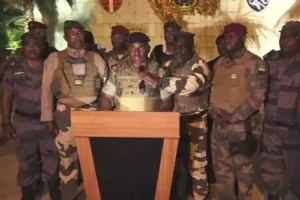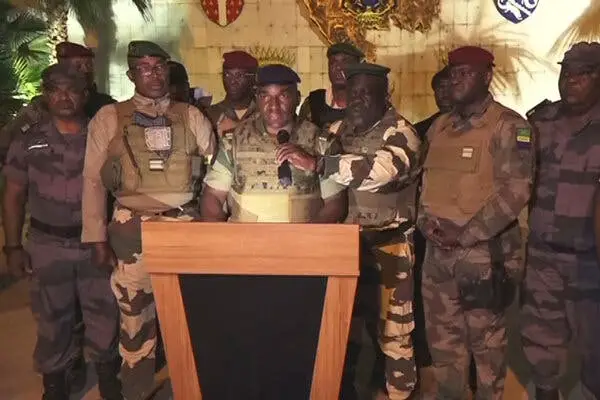
The Central African oil-producing nation of Gabon was hit yesterday by the pandemic of military coups sweeping across Africa, following the statement by army officers that they had deposed President Ali Bongo and placed him and several members of his family under house arrest.
According to troops on national television, the Gabonese junta chose General Brice Oligui Nguema, chief of the elite Republican Guard and a relative of the ousted president, as transition leader.
Nguema had previously commented on Bongo’s fate. “He is a Gabonese head of state,” he explained. He is retired and has all of his rights. He is much like the rest of us Gabonese.” Bongo has stated that he is under house arrest in the capital, Libreville, and has urged civilians to “make noise” in the aftermath of the coup attempt.
Gabon’s coup warnings came just weeks after members of Niger’s presidential guard took control and installed a junta. President Bongo succeeded his father, Omar, who had controlled the country since 1967. The officers also claimed to have arrested the president’s son, Noureddin Bongo Valentin, and others for treason and corruption.
Bongo, 64, was last spotted voting in public on Saturday. Before the election, he was observed looking healthier than in his more feeble televised appearances following his stroke in 2018.
The military junta intervened just minutes after the Central African state’s election commission declared him the winner of a third term. The officers, known as The Committee of Transition and the Restoration of Institutions, stated that the country was in the midst of a “severe institutional, political, economic, and social crisis.” They said that the voting on August 26 was not credible.
After a tense poll that was set to extend the Bongo family’s more than half-century reign, officers claiming to represent the military forces claimed on television that the election results were invalidated, borders were blocked, and state institutions were disbanded.
Bongo emerged in a social media video Wednesday, pleading for help from “friends all over the world” after being placed under house arrest.
According to a business working for the administration, the footage of the president speaking is genuine. The deposed leader was sitting in his “residence,” a beautiful chamber with wood-paneled walls, rich rugs, and leather-bound books.
Opponents claim the family has done nothing to share the state’s oil and mining wealth with the state’s 2.3 million residents. After Bongo’s disputed 2016 election victory, violent unrest erupted, and a coup attempt was repelled in 2019.
Nguema, who had previously appeared in a video and been welcomed as their leader, informed the French newspaper Le Monde that he and other generals would meet yesterday to choose a leader for the transitional administration. For the first time since the election, internet service appeared to be restored yesterday.
“Everyone will put forward ideas, and the best ones will be chosen, as well as the name of the person who will lead the transition,” he explained. Television pictures showed soldiers hoisting a guy who appeared to be Nguema and yelling “Oligui president,” one of his names. Gabon’s administration did not respond immediately.
Hundreds of people welcomed the military intervention in Gabon’s capital, while France, Gabon’s former colonial master with troops stationed in the African country, criticized the coup.
The Gabonese coup would be the eighth since 2020 in West and Central Africa. The most recent was in Niger in July. In Mali, Guinea, Burkina Faso, and Chad, military officers have seized control, undoing democratic achievements made since the 1990s.
“I’m marching today because I’m happy.” “The Bongos are out of power after nearly 60 years,” said Jules Lebigui, a jobless 27-year-old who joined throngs in Libreville.
Gabon, which is further south on the Atlantic coast than Niger and other Sahel countries, has not had to contend with destabilizing Islamist insurgencies. However, the coup is yet another symptom of democratic regress in the volatile region.
“With the coup leaders claiming to represent all factions of Gabon’s security apparatus, Mr Bongo is not expected to be able to suppress the uprising,” wrote Rukmini Sanyal, an analyst at Economist Intelligence Unit, citing “widespread public discontent” against Bongo, his family and his ruling party.
A lack of international observers, the suspension of some foreign broadcasts, and a decision to cut internet service and impose a night-time curfew after Saturday’s election had raised concerns about the vote’s transparency. Bongo’s team rejected allegations of fraud.

Comments